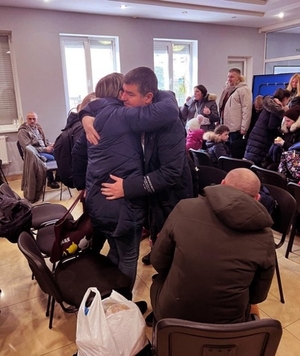U.S. Ministry Readies for 'Marathon' of Aid to Ukrainians
 |
|
This Slavic Gospel Association-supported church in Rivne, Ukraine, has welcomed scores of refugees from war. SGA leaders find migrants often need crisis counseling as well as food and fuel. One family reached the Rivne church after surviving 19 days in a cellar stuffed with 90 people, who had to melt snow and drain radiators for drinking water.
|
Slavic Gospel Association helps refugees in body, mind & spirit
NEWS PROVIDED BY
Slavic Gospel Association (SGA)
April 20, 2022
LOVES PARK, Ill., April 20, 2022 /Christian Newswire/ -- Ukrainian refugees lodging at evangelical churches across Eastern Europe are reporting atrocities scarring psyches, crucial needs for water and food, and desperate attempts to escape the war zone by car and foot.
Julia reached a seminary that Slavic Gospel Association aids in Warsaw, Poland, only after a harrowing escape from the Ukrainian city of Irpen. The young adult said the military onslaught there has led to local women being raped, homes ransacked for food and large sections of town leveled.
"It's very, very difficult. ... It's hard. For me, my heart, it's pain every day," she said, distraught at the memories.
A mother and her two children at an SGA-supported church in Rivne, Ukraine, reported having to melt snow and drain radiators to quench their thirst during nearly three weeks in a group of 90 in a pharmacy's basement in bombarded Mariupol. A 19-year-old man would leave the basement and brave gunfire for two hours each day in search for water.
The United Nations High Commissioner for Refugees said that of close to 5 million Ukrainians who have fled their country – nearly half of them children – slightly over 50 percent are in Poland, 10 percent in Russia, and just under 1 percent in Belarus. SGA is giving them humanitarian aid through local congregations in 22 cities across those nations, with those in Belarus joining relief efforts starting this month.
Refugees Fill Churches, Homes
Lay Pastor Maksym Sliazin has many fellow Ukrainians as well as a group from Belarus at his church plant, Fourth Baptist in Gdansk, Poland. Attendance before the war was 70-80 on a typical Sunday, but the refugee influx has tripled that. He said most people in the congregation are housing refugees in their homes – up to three families in one small apartment – while 10 people's beds and belongings fill each of the church's Sunday school rooms.
"We have many women with kids, and probably, if the war won't stop, in six months or in one year we could have many widows who will have no place to return," Sliazin explained. "So, in my opinion, what we are going to do in our strategy has to be not a sprint but a marathon."
Eric Mock, SGA's vice president of ministry operations, said Ukrainians abroad face some major hurdles, including language barriers and a lack of work for females. Knowing those challenges, the ministry is planning to train more church workers in the region, devote additional funds for ministry to children, and expand classes in biblical crisis counseling.
"Pastors like Maksym are not only caring for their congregations," Mock said. "Now, all of a sudden, there are hundreds of people that not only have to be ministered to, they need documentation, their lives need to be sorted out. What I'm seeing is heroism. I'm seeing people pouring out their lives."
Next Steps
Back in Ukraine, the U.N. estimates 7 million are displaced within their own country and more than 15 million need aid. That compounds the longtime humanitarian crisis resulting from the 2014 war with Russian-backed separatists that left scores in eastern Ukraine without running water or adequate shelter.
"I view that as a microcosm of what is going to happen after the conflict settles down in Ukraine," said Michael Johnson, SGA president. "What we experienced in eastern Ukraine is really going to prevail throughout the entire country. So for us, as we look down the road, beyond the conflict, we're going to see many, many opportunities to minister to people who have lost everything."
Slavic Gospel Association differs from most foreign organizations providing relief to Ukrainians because instead of sending large aid shipments, it supplies funds directly to pastors, who buy groceries, tanks of gas and other items for those in need. Founded in 1934, SGA has seen the region's governments go from persecuting its workers to welcoming them in humanitarian crises by both preaching and demonstrating the Gospel.
"Many people have left Ukraine to avoid the shelling and the fighting, but we're also finding many, many pastors and leaders in churches have stayed behind because they feel called to minister to the people in those areas," Johnson explained. "Obviously, they're exposed, they're at risk, they pray for God's protection, but they also pray for opportunities to minister to their people in their regions."
Founded in 1934, Slavic Gospel Association (SGA, www.sga.org) helps "forgotten" orphans, widows and families in Russia, the former Soviet countries of Eastern Europe and Central Asia, and Russian-speaking immigrants in Israel, caring for their physical needs and sharing the life-transforming Gospel of Jesus Christ. SGA supports an extensive grassroots network of local evangelical missionary pastors and churches in cities and rural villages across this vast region.
SOURCE SGA
CONTACT: Kyle Huckins, 806-463-8793, khuckins@inchristcommunications.com

